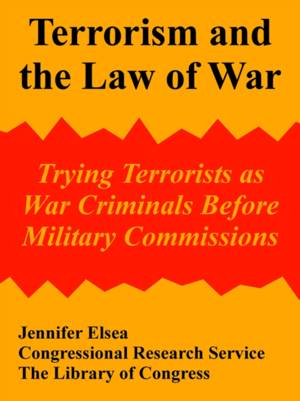
- Retrait gratuit dans votre magasin Club
- 7.000.000 titres dans notre catalogue
- Payer en toute sécurité
- Toujours un magasin près de chez vous
- Retrait gratuit dans votre magasin Club
- 7.000.0000 titres dans notre catalogue
- Payer en toute sécurité
- Toujours un magasin près de chez vous
Terrorism and the Law of War
Trying Terrorists as War Criminals Before Military Commissions
Jennifer Elsea, Congressional Research Service, The Library of Congress
Livre broché | Anglais
18,45 €
+ 36 points
Description
On November 13, 2001, President Bush signed a Military Order pertaining to the detention, treatment, and trial of certain non-citizens as part of the war against terrorism. The order makes clear that the President views the crisis that began on the morning of September 11 as an attack "on a scale that has created a state of armed conflict that requires the use of the United States Armed Forces." The order finds that the effective conduct of military operations and prevention of military attacks make it necessary to detain certain non-citizens and if necessary, to try them "for violations of the laws of war and other applicable laws by military tribunals." The unprecedented nature of the September attacks and the magnitude of damage and loss of life they caused have led a number of officials and commentators to assert that the acts are not just criminal acts, they are "acts of war." The President's Military Order makes it apparent that he plans to treat the attacks as acts of war rather than criminal acts. The distinction may have more than rhetorical significance. Treating the attacks as violations of the international law of war could allow the United States to prosecute those responsible as war criminals, trying them by special military commission rather than in federal court. The purpose of this report is to identify some of the legal and practical implications of treating the terrorist acts as war crimes and of applying the law of war rather than criminal statutes to prosecute the alleged perpetrators. The report will first present an outline of the sources and principles of the law of war, including a discussion of whether and how it might apply to the current terrorist crisis. A brief explanation of the background issues and arguments surrounding the use of military commissions will follow. The report will then explore the legal bases and implications of applying the law of war under United States law, summarize precedent for its application by military commissions, and provide an analysis of the President's Military Order of November 13, 2001. Finally, the report discusses considerations for establishing rules of procedure and evidence that comport with international standards.
Spécifications
Parties prenantes
- Auteur(s) :
- Editeur:
Contenu
- Nombre de pages :
- 60
- Langue:
- Anglais
Caractéristiques
- EAN:
- 9781410221612
- Date de parution :
- 18-03-05
- Format:
- Livre broché
- Format numérique:
- Trade paperback (VS)
- Dimensions :
- 210 mm x 279 mm
- Poids :
- 158 g

Les avis
Nous publions uniquement les avis qui respectent les conditions requises. Consultez nos conditions pour les avis.






